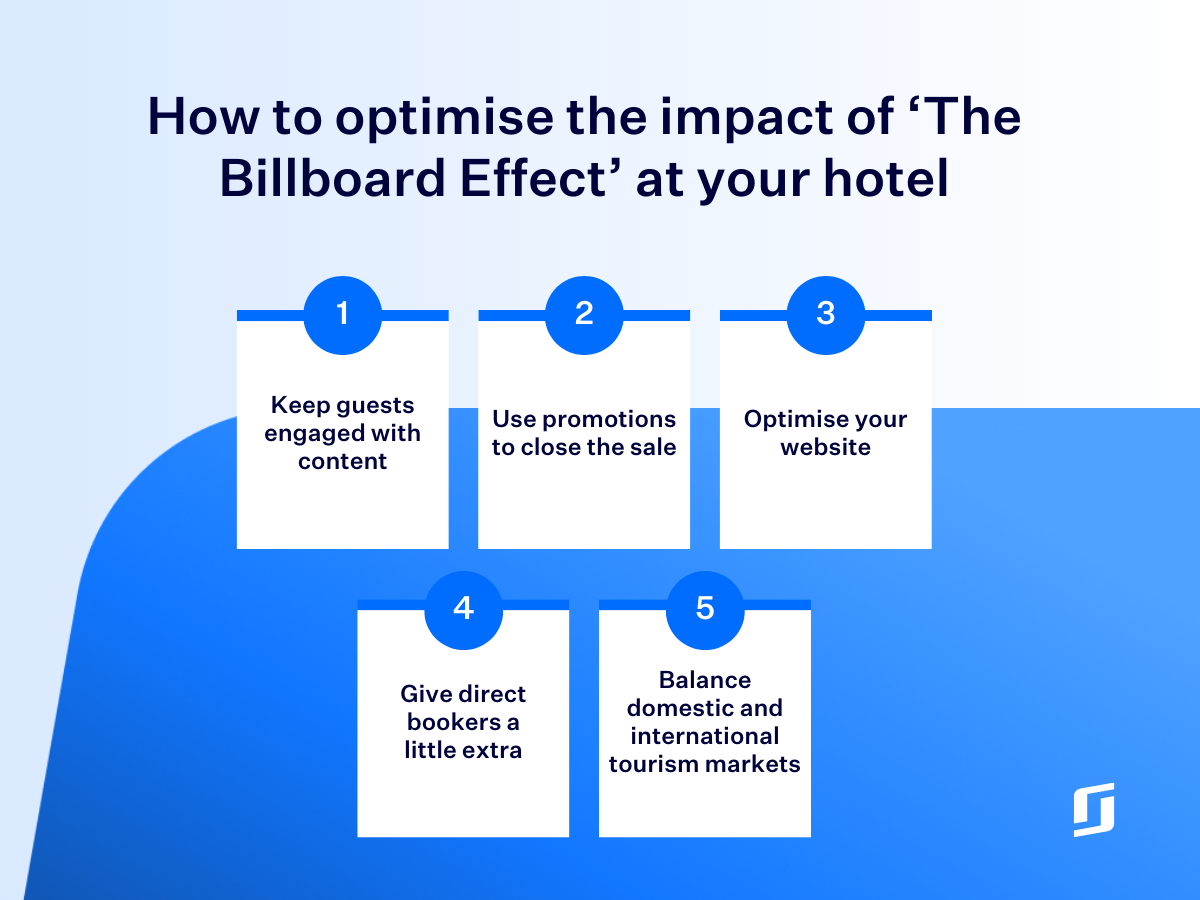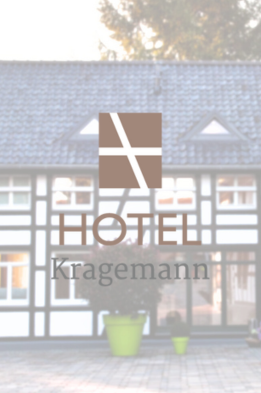What is ‘The Billboard Effect’?
The Billboard Effect definition: When a guest discovers a hotel through an online travel agent (OTA) like Booking.com or Expedia, or a metasearch engine like Google Hotels or Trivago, but ends up booking directly with the hotel on its website.
The billboard effect was first described in 2009 by Chris Anderson, an Associate Professor at Cornell University. For accommodation providers who know how to capitalise on it, a billboard effect marketing strategy can prove a powerful way to maximise bookings and revenue.
Table of contents
The impact of The Billboard Effect in marketing for hotels
Despite popular belief that ‘The Billboard Effect’ is but a shadow of its former self, recent research suggests tales of its demise have been much exaggerated.
It may be true that online travel agents (OTAs such as Booking.com, Expedia, and Airbnb) are certainly now the most popular site for travellers to visit. They’re using it for research, inspiration, and final booking decisions.
However, the influence of OTAs on direct hotel website visits is still very much alive. Google found that over half of all travellers will visit a hotel’s website after seeing it on an OTA.
Often, ‘The Billboard Effect’ is diminished by frustration. Travellers make a shortlist of interesting hotels they find on the OTA and then check each hotel website for more information. If they don’t find the same room types, names, pictures, and policies they get frustrated and head back to the OTA.
This is why it’s so important to treat your OTA profile like an extension of your own website so the offer you make to guests is consistent.
Nethertheless, the report proved that being listed on an OTA’s site increased reservations through the hotel brand’s site – so how can you take better advantage of the traffic your website receives from visitors coming via OTAs?
Exploit the billboard effect with SiteMinder Capitalise on the billboard effect and earn more per booking with SiteMinder’s direct booking features, which allows guests to quickly and easily make bookings through your website.
Why should hotels take advantage of The Billboard Effect?
In the billboard effect hotels have an organic marketing opportunity similar to that offered by Google.
The advantages of the billboard effect in business terms are many and varied, including:
- Expanded reach: OTAs and metasearch engines have incredible reach, so by listing your hotel on the likes of Booking.com and Expedia you gain access to millions of potential guests.
- Free advertising: Hotels aren’t charged for simply listing on these platforms, so you can gain access to huge audiences for free!
- More bookings: For a hotel billboard effects can drive far more bookings by getting your property in front of far more potential guests.
- More revenue: One of the biggest reasons to implement this strategy is the added billboard revenue. OTAs commonly charge a 15%-25% commission on every booking – the billboard effect drives direct bookings that allow you to keep that cash.
Example of The Billboard Effect in the hotel industry
We’ve got our billboard effect marketing definition, but what does this phenomenon look like in real life?
Let’s say your hotel attracts plenty of business travellers. You begin constructing your travel ‘billboards’ by listing your hotel on the major booking platforms, as well as all the niche OTAs that speak more directly to a corporate audience.
You then work to ensure that potential guests know that they can book direct with you, and incentivise them to do so. You mention your direct booking capabilities on your website and social profiles, and promote things like direct booking deals, loyalty programs and best price guarantees.
You create ads and content that keeps direct booking top of mind for anyone who is considering booking with your hotel.
Often if there is enough awareness of the incentives, guests will be happy to book directly with your accommodation.

How to optimise ‘The Billboard Effect’ for your hotel
As a hotel operator you should make sure your online presence is easy to find, is attractive, and stands up to the competition. Here are five ways you can convert travellers into guests who book direct:
1. Keep guests engaged with content
When a traveller finds themselves on your website you obviously don’t want them to leave without making a purchase. In an ideal world, every visit would equal a booking. To increase your chances you need to offer visitors interesting and relevant information.
The easiest thing you can do is create a blog where you can share travel stories, tips, news, and information on the local area such as events and tourist attractions.
If you have any partnerships with local businesses, you should also list these and the ways guests can benefit from the agreement including discounts to cinemas, restaurants, or activities.
The more time a guest spends on your website, the more familiar they become with your brand and the likelihood of a booking increases.
2. Use promotions to close the sale
When a traveller is investigating the idea of booking with your hotel, you should have an online booking engine they can engage with. One of the ways this technology will help drive direct bookings is through the use of deals and offers. When a guest clicks on your rates, use your booking engine to highlight hot deals, last minute offers, early-bird rates, or particular packages. This will create purchase impetus and give the traveller an extra incentive to buy.
3. Optimise your website
Nothing will send a user back to the OTA quicker than a bad user experience on your hotel’s website. Your site needs to be aesthetically pleasing with high quality images and clear font, load quickly, and be functional on all devices; especially mobile.
It’s also important for guests to easily rediscover your website if they want to visit again. This means you also need to pay close attention to your search engine optimisation.
If you’re not experienced or knowledgeable in website design, the best thing you can do is invest in intuitive website builder software, that does everything for you and is constantly updated.
4. Give direct bookers a little extra
While rate parity will dictate you don’t undersell or oversell yourself in comparison to the OTAs, there are still ways to push your percentage of bookings closer to direct.
For instance, you might offer a deluxe room at the same rate on both your website and on booking.com but on your website you can offer the room with the added benefit of free breakfast. This way you can get the direct booking and save on the commission you would have paid to the OTA. This traces back to giving guests value-for-money and instils a sense of loyalty in them to your brand.
5. Balance domestic and international tourism markets
It’s a good idea to manage your channel connection effectively by balancing your distribution between domestic and international travellers.
While international travellers might be more inclined to make a booking through the OTA, regional travellers could be thorough in their research of your website and be more likely to book directly. A healthy balance between global and localised channels is recommended for effective hotel distribution.

